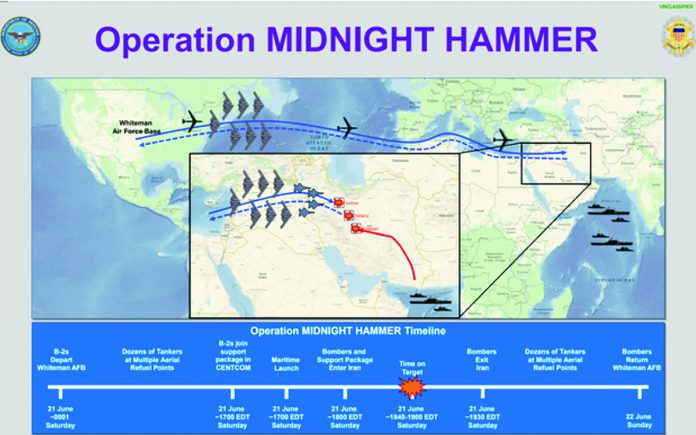Nusrat Mirza
In today’s rapidly changing world, global power dynamics are being reshaped before our eyes. The United States, once known for policing every corner of the globe, seems to be stepping back, not out of weakness, but with a strategy in mind. It’s new approach? Focus on the bigger picture.
Recent events, especially the June 2025 Iran-Israel conflict, clearly reflect this shift. The U.S., rather than rushing into war, chose a calculated silence, stepping in only when absolutely necessary. This isn’t abandonment – it’s a redefined doctrine.
President Donald Trump’s behavior – often described as unorthodox – is actually a signal of a broader transformation. Take the Indo-Pak conflict of May 2025. When tensions skyrocketed, Trump declared both nations friends and encouraged them to resolve their issues independently. It was a surprising stance, but telling that the U.S. is no longer eager to burn its energy on regional disputes. Instead, it’s conserving power for the real global game: balancing China and Russia.
India, believing it had silent approval from Washington and overt encouragement from Tel Aviv, made a grave miscalculation. On May 10, 2025, it launched an offensive against Pakistan. But instead of an easy victory, India was dealt a sharp military and diplomatic defeat. Pakistan responded swiftly and decisively, exposing the myth of Indian superiority in both military strategy and technology. Moreover, the fallout revealed more than battlefield losses.
It highlighted India’s internal weaknesses: vast economic disparity, a fragmented society, and the dangerous rise of Hindutva extremism. Once celebrated for its religious pluralism, India now grapples with internal division. Muslims, Christians, Sikhs, and other minorities feel increasingly unsafe. More than 30 separatist movements are active, and southern Indian states openly reject the aggressive northern narrative. The ruling ideology rooted in RSS and BJP’s vision is less about nationalism and more about exclusivity, echoing early fascist thought.
Then came June 13, 2025. Israel, long eager to confront Iran, launched a surprise attack. While the U.S. maintained an official stance of neutrality, behind-the-scenes support told a different story. But Iran wasn’t an easy target. It pushed back hard, damaging Israeli oil depots, military bases, key infrastructure, and most importantly, it broke the Israelis’ sense of being 100% protected. The shockwaves reached Washington.
For the first time in years, U.S. policymakers questioned whether unwavering support for Israel served American interests. Israel’s over reliance on American protection became evident. And while the U.S. had hoped for a swift Israeli victory, it now found itself reconsidering the cost of that alliance.
However, the global stage is changing. Arab Muslim nations, particularly in the Gulf, are stepping up. With economic clout and regional influence, they offer the U.S. alternative partnerships – less complicated and more pragmatic. As this unfolds, the once unbreakable Judeo-Christian political alliance begins to show cracks.
Even within America, Christian voices are growing wary of disproportionate Zionist influence. Historical grievances, like the crucifixion of Jesus, still resonate in religious consciousness. It’s not about hate – it’s about balance. Many American Christians are now questioning whether U.S. foreign policy reflects their values or someone else’s agenda.
So, where do they, we, and all of us go from here? The answer may lie in a renewed alliance – this time between Muslims and Christians. Not as a clash of civilizations, but as partners in peace. Together, these communities represent more than half the world’s population. They share values of justice, family, and faith. And in a world driven by conflict, such unity could be a stabilizing force. Even in the Holy Qur’an, Muslims are reminded of this shared ground:
“You will surely find the most severe enemies of the Muslims to be the Jews and the polytheists. And you will certainly find those who say, ‘We are Christians,’ to be the closest to Muslims in friendship. This is because among them are scholars and devout worshippers, and because they are not arrogant.” – Surah Al-Ma’idah (5:82)
In this regard, Arab states have a critical role to play. By acting wisely and offering the U.S. a genuine, balanced alternative, they can help America free itself from narrow influences. This isn’t just diplomacy – it’s a chance to reshape the future.
America’s desire for global supremacy is clear. But to truly lead, it must shed outdated burdens. The Zionist grip – while historically powerful – may now be more of a liability than an asset. If the U.S. is serious about peace, prosperity, and leadership, then its alliances must reflect the real dynamics of the modern world.
President Trump’s actions, strange as they may seem, might be part of a deeper strategy: let others fight, profit from the chaos, and dominate the narrative. He may have also understood the dangers of aligning too closely with Israel’s war-driven worldview. After all, Israel’s obsession with reducing global population and fueling wars could eventually drag the U.S. into conflicts it no longer wants to fight.
Back in 1979, during my conversations with wealthy American Christians, I sensed their unease about Zionist control. They felt trapped. But today, the winds are shifting. With the right steps, this could be the beginning of a more balanced world order – one shaped not by domination, but by cooperation.
The time for Muslim-Christian unity is now – therefore not just as an idea, but as a blueprint for peace and shared progress.
The author is the Chief Editor of the Monthly Interaction.










